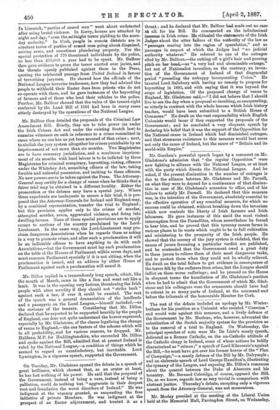The rest of the debate included an apology by Mr.
Winter- botham for his position as a Unionist who resisted "Coercion" and would vote against this measure, and a lively defence of the Government by Mr. Maclean, who, however, advocated the substitution of the Scotch majority system for the provision as to the removal of a trial to England. On Wednesday, the principal speeches of note were Mr. De Lisle's manly speech, delivered as a Roman Catholic, on the un-Catholic attitude of the Catholic clergy in Ireland, some of whose actions he boldly characterised as " crimes ;" a speech of Lord Kileoursie's against the Bill,—he must have got over his former horror of the "Plan of Campaign,"—a manly defence of the Bill by Mr. Dalrymple; and an elaborate speech of Lord George Hamilton's, illustrating the tyranny of the League, and exposing Mr. Dillon's romances about the quarrel between the Duke of Abercorn and his tenantry. Mr. Bernard Coleridge, of course, opposed the Bill. He, as we know, regards law as very trivial in comparison with abstract justice. Thursday's debate, excepting only a vigorous speech from the Attorney-General, was not momentous.


































 Previous page
Previous page